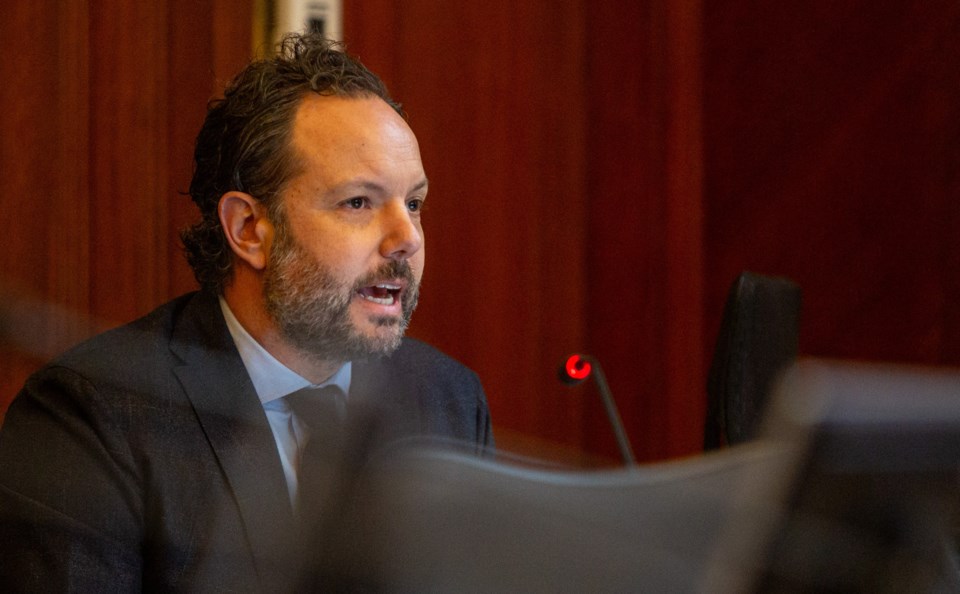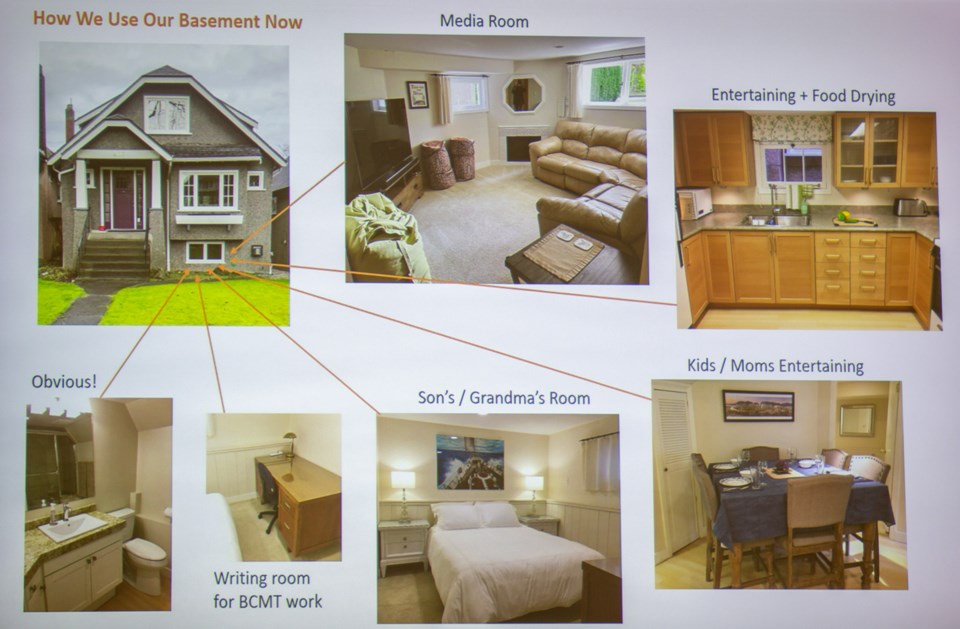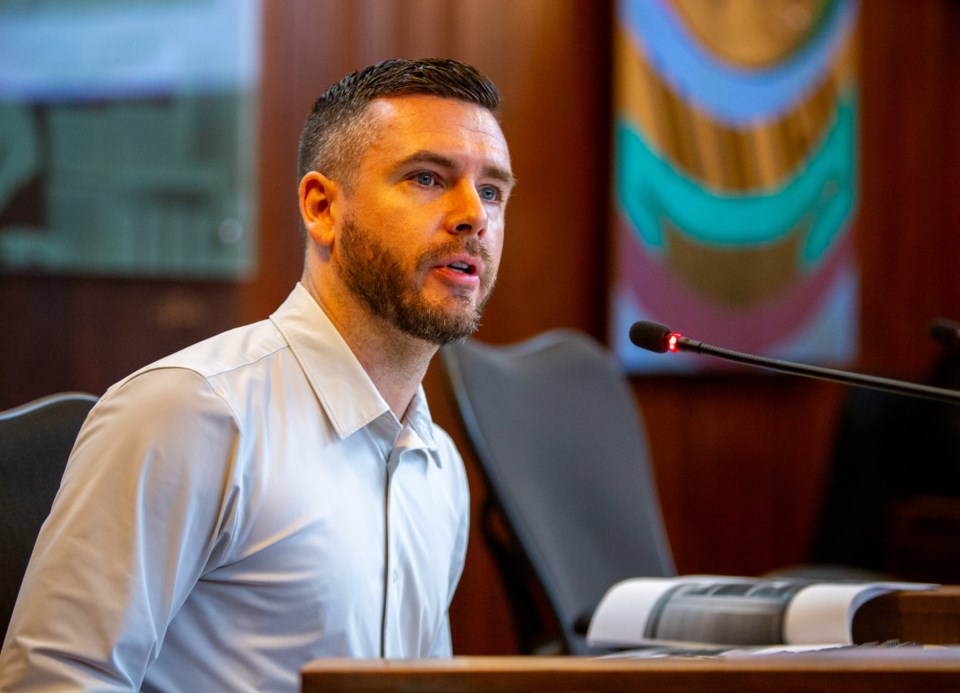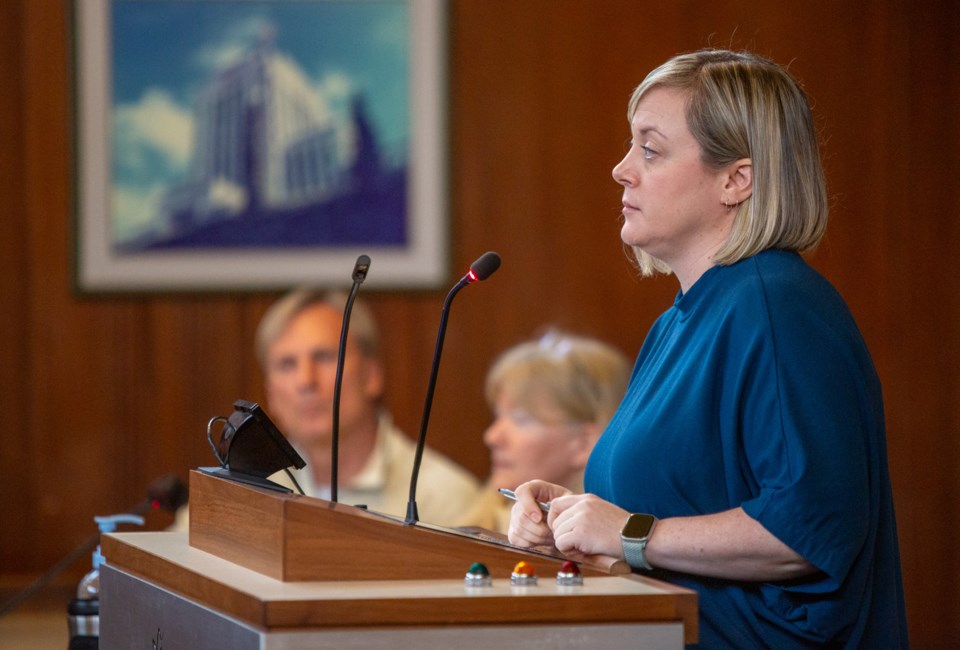As Julee and Jerry Kaye see it, they should be able to do what they want with their West Point Grey home when it comes to its use.
That includes renovating a derelict basement suite, which they did shortly after they bought the 1929 craftsman-style character house on West 13th Avenue in 1998.
“There are police records about that suite,” Julee said. “The neighbours were relieved when we renovated that suite and got it approved [by the City of Vancouver].”
The suite served as a mortgage helper for 19 years.
Once the mortgage was paid, the couple began to use the space for themselves, using the kitchen to prepare food for camping trips, hold movie nights with friends and have family reside in the space during holiday visits.
Then in 2019, the Kayes put the suite on the short-term rental market via Airbnb.
The couple estimates the suite has been booked at least 70 times at a rate of $126 to $200 per night, depending on the season. The home’s proximity to the University of B.C. has attracted academics, people visiting family at the university and others in town while a relative is in hospital.
That “public service” — as Julee described it — came to an abrupt end in December 2023 when the couple received a letter from the City of Vancouver, saying their short-term rental licence was suspended.
The suspension stemmed from a public complaint, which triggered an investigation by the city that included an inspection of the Kayes’ suite.
The city concluded the suite was not part of the Kayes’ principal residence — that it was a stand-alone unit — and therefore contravened the city’s short-term rental bylaw.
The Kayes attended city hall Wednesday in an effort to overturn the suspension and appeared before a three-person business licence review panel comprised of councillors Christine Boyle, Peter Meiszner and Mike Klassen.

Principal residence
Before they had their turn at the microphone, the couple heard from Sarah Hicks, the city’s chief licence inspector, and city lawyer Robert LeBlanc, who began his opening remarks by reading part of the city’s short-term rental bylaw.
“No person shall carry on business as a short-term rental accommodation operator unless the short-term rental accommodation being provided is the principal residence of that person,” LeBlanc said. “For the purposes of this bylaw, a person may only have one principal residence.”
The city first began regulating short-term rentals in April 2018 to help protect long-term rental housing and allow residents to earn additional income.
Under the bylaw, a person who provides temporary accommodation in a dwelling unit other than a bed and breakfast or hotel is deemed a short-term rental operator and is required to obtain a business licence.
The accommodation must be provided in the operator’s principal residence. The bylaw says an operator can rent their entire home, or a room within that home, for less than 30 consecutive days at a time.
In providing evidence, Hicks said the Kayes’ basement was approved in 2006 as a “permanent secondary suite” and that the couple lived upstairs in the house. The application to make the suite permanent was filed by Julee, the panel heard.

'Share it full time, or not share it all'
The Kayes emphasized throughout the hearing that the suite is not solely used for Airbnb and that their adult sons stay there when returning from university.
In a slide presentation, the Kayes showed a food dryer in the kitchen, a media room and a “writing room” for work they do with the non-profit, B.C. Marine Trails.
“We're prepared to share our basement part time, but not full time permanently for the years a tenant might choose to stay,” Julee told the panel, noting her nephew currently resides in the suite and attends UBC.
“We used to share it full time. Right now, we want to have some use of it ourselves. What we hear from the city is you must share it full time, or not share it at all.”
She noted the suite does not have a separate mailing address or insurance policy.
“How can our own basement not be part of our principal residence?” she said.
Jerry argued there’s nothing in the bylaw that specifies that a homeowner “must use the basement yourself for a week or a month or four months or whatever the timeline is.”
“The reality is,” he said, “we use the whole house for a significant portion of the year. And when it's available for rental, we want to get some extra money if we can.”
To allow the suite to be legally listed with Airbnb, the kitchen would have to be removed, said Hicks, noting the process could be complicated with changes to building codes and additional requirements to remove the permanent status of the suite.
'Deplete the city's permanent housing stock'
In his closing remarks, LeBlanc told councillors he wanted to be clear that the hearing was not about whether Julee Kaye was a conscientious homeowner or a conscientious Airbnb operator.
“By all accounts, she appears to be so, but that's not a question for the panel,” he said.
“It's also not a matter of whether or not the downstairs has a stove in it, or whether it's used to host guests or have dinner parties. It's also not about what Ms. Kaye thinks the law should be.”
LeBlanc again pointed to the principal residence policy set out in the bylaw, emphasizing the city’s purpose in drafting the bylaw.
He said a person using a property exclusively for short-term rental would “deplete the city's permanent housing stock and further exacerbate the housing crisis that we find ourselves in.”

'Massive housing crisis in Vancouver'
In the end, the panel agreed to suspend the licence, although Klassen said before he voted that he was “not entirely convinced that this is a clear-cut case of an abuse of our bylaw.”
Klassen said there is a “lack of clarity for me as to the use of the home.”
“We don't have a time period outlined in our bylaw that says how long you should be able to be in a place or not be in a place — a short-term rental versus using it as your own home space for sharing with [adult] children that are coming home,” he said. “So I’m really struggling with this one.”
Boyle suggested the Kayes might work with staff and health-care providers to find a legal way to accommodate out-of-town people coming to Â鶹´«Ã½Ó³»for a medical procedure.
“It's a topic that council will be discussing next week, actually,” she said. “So maybe there's an opportunity to work with the lung transplant folks or others to figure out some option there that would allow compliance [of the bylaw].”
Meiszner commended the Kayes for their presentation but concurred with city staff’s position that the couple’s setup at their house was in contravention of the bylaw.
“It's unfortunate that you are caught up in this situation, but unfortunately we are in a massive housing crisis in Vancouver,” he said.
“And we need to do everything we can to protect every available possible rental unit. To me, this is a possible rental unit for somebody on a full-time basis. So in good conscience, I can't support reissuing your business licence.”
'Public benefit'
After the hearing, the Kayes told Glacier Media they were disappointed in the panel’s decision and say they have no plans to remove the stove from the suite or do further renovations to list the space again on Airbnb.
Nor do they plan to put the suite on the long-term rental market, citing media reports and cases with problem tenants, who are not easy to evict under current provincial laws. At the same time, the couple said they had no problem tenants in the 19 years they rented the house.
“I think there's still a lot of public benefit that can be gained by allowing it to be shared part time, which is what I was doing through Airbnb,” Julee said.
“By telling me I'm not allowed to share it part time, the city is eliminating all those benefits and increasing the pressure on other housing stock.”
Added Julee: “The people who stay at my place for medical treatment at UBC, they still need to stay somewhere. People who are visiting faculty there or visiting friends, neighbours and family in the neighbourhood, they all need to stay somewhere. That benefit is lost now.”








